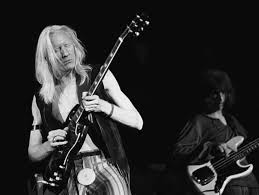(This review originally printed in the UCSD Triton Times in 1980.)
A seeming majority of reviewers and taste makers have exhausted their superlatives justifying their declaration that The Clash's London Calling record the hottest double record set since Exile On Main Street. I've been tempted to retaliate with my half facetious declaration. Elvis Costello's record, Get Happy!! (I would have written) is the greatest double rock record since Blonde On Blonde. With the gauntlet thrown to the floor, warring factions would man the ramparts and try to pick each other off with sniper-tongued pot-shots. Nonsense on two counts. First, although Get Happy!! contains 20 songs, it is, in fact, a single record with 10 selections per side, where Dylan's double set Blonde On Blonde, with several songs going well over three minutes, holds less material. More importantly, however, is the nonsense rock reviewers in general (me included) indulge in when they sling about comparisons that pale once separated from the heat of the moment. Common-sense and sober thinking show that the Clash is an earnest band who haven't developed the stylistic subtleties that the Stones used to manage and that Costello, apart from a shared genius for non-sequiturs, has little in common with Dylan. This brings us to what, Get Happy!! really is: neither a masterpiece nor a landmark to be prematurely canonized, but instead a firm confirmation of the major talent his audience suspected he possessed.
The major revelation on Get Happy!! is that Costello, like many had hoped, has transcended the slight trappings of new wave and has become a songwriter, an artist with a firm grasp on his material who can write songs using an encyclopedic array of song styles to their full measure. The 20 songs on Get Happy!! comprise something of a brief course in the history of pop music style. Costello, it should be pointed out, is hardly a new wave dilettante who plagiarizes other people's art because he's unable to develop his own voice.
Rather, Costello shares methodological affinities with the patron saint of the French New Wave film school, Jean Luc-Godard. Godard, who through his young life had been surfeited with American genre films by John Ford, Howard Hawks, Nicholas Ray, Sam Fuller, and other Hollywood directors, took to making his own films during the late 60s, using many of the same camera stylistics of his American influences. Godard, aware that he was a French intellectual first and that he couldn't make "American" films no matter how much he admired the visual gracefulness American directors occasionally managed, ended up subverting the genres, inserting heavy doses of philosophy, Marxist literary criticism, dissertations on dissociative language, and other notions stemming from the French proclivity for spinning theories, concepts that Godard's American film influences would doubtlessly stand gap-mouth at. Film genres to Godard, then, were a medium he could use, alter, retool, change, subvert.
Costello is a songwriter of course, and one wouldn't belabor a comparison between him and Godard beyond a simple point: like Godard, Costello shuffles music styles and makes use of them the way he wants. He does this through his lyrics, which along with Steely Dan's are the most disturbing, dense and difficult in rock. Often times, Costello enjoys writing a lyric with no literal meaning against a melody that evokes something else entirely. In "Secondary Modern," with a soft croon over a melody that could pass for some blander efforts of Jackson Browne, Costello sings: "This must be the place / Second place in the human race / Down in the basement / Now I know what he meant / Secondary modern / Won't be a problem / Til the girls go home..." The melody, as pleasing as anything else could be, says one thing, but the lyrics, full of sparse details and indirect innuendo, deny that pleasure. Costello's aim seems to be to set us up in the visceral plane, and then to pull the rug out from under us once the words sink in. Dangerous activity.
Lack of space makes it impossible to go into a song-by-song account, but here are some of the choice tracks. "Motel Matches," set in a gospel vein, is abstracted teenage heartbreak, an implied story of a lover's concern for his girlfriend's loose ways. "Opportunity," a jaunty tune in a stiff gallop tempo that concerns, incredible enough, the Hider and Mussolini baby boom campaigns. "Man Called Uncle," is an excellent hard rocker where Costello condemns beautiful people who've resigned their free-will so that they could become mere sexual playthings to rich people, and expressing a tacit yearning for real love without usury. Costello's main theme throughout is that he's against anything that keeps people from becoming the human being he'd like to see them become, against those institutions that divide people, denatures them, turns them into a mindless horde that consumes, kills, and continually destroy each other.










